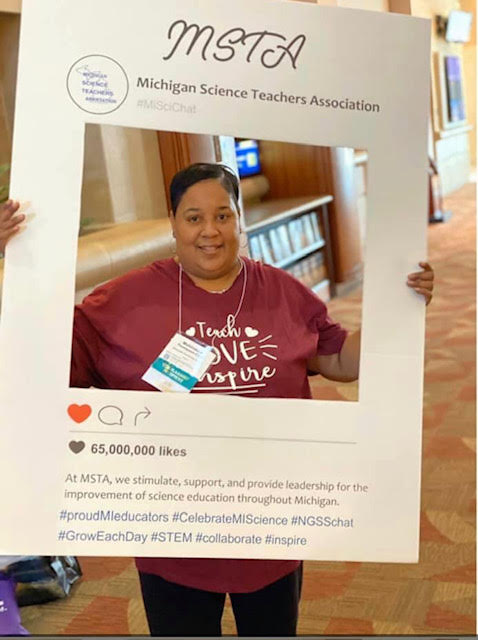
STEM Q&A: Mshindani Thompson-Cook, Educator
Q: Can you tell me about yourself and your background in education?
A: “I’ve been teaching for 23 years with Detroit Public Schools. I’ve taught pre-k through 5th grade. I’m currently a kindergarten teacher at Marquette Elementary School.”
Q: When did you know you wanted to become an educator? What inspired you?
A: “Probably at the age of 7 when I would play school with my stuffed animals. Both of my parents and my grandmother were educators. It is just something I always loved.”
Q: What is your favorite part about being an educator?
A: “To see the excitement on my students' faces when they have achieved a skill or figured a problem out. Seeing the growth they have made from the beginning to the end of year. Those are the greatest parts.”
Q: What sparked your interest in STEM?
A: “I started STEM when it first came out with my pre-k students. When I say they enjoyed the discovery, we even included art and made it STEAM. I saw it in 3 and 4 year olds. If they have the excitement, it will work with any grade.”
Q: How do you think STEM prepares students for the future?
A: “The problem-solving aspect of it is cross-curricular and includes every day skills. Taking chances, building social emotional skills. They are okay with making a mistake after you have instilled the properties of STEM. That’s what we do.”
Q: Why do you think it is important for students from all backgrounds to have access to STEM?
A: “It instills a love of science for all races. I really encourage my girls. Usually, my girls are kind of stand offish from science. When we use STEAM techniques, they enjoy it just as much. Over the summer my girls enjoyed the building and tech aspects even more then my boys. It was amazing.”
Q: How do you think we can encourage more girls to engage in STEM? Why is that important?
A: “I think if we start at the pre-k level and include that discovery and those questions it would build that interest. Start after school programs that allow girls into science so they can see different areas of science. I like to have books about science with different cultures, boys and girls, to open new opportunities.”
Q: What are some STEM successes you have seen with the students that you have taught?
A: “The working together. The questioning that they do. I pose a problem and they work through it. Even at a pre-k level. They take chances. They are okay to make mistakes. They redo it. It just amazes me how focused they are. The arguing stopped. They didn’t want to leave. They still wanted to be there doing those projects.”
Q: Do you think that STEM learning has an impact on student confidence? Why or not?
A: “Definitely. I see it in all areas of curriculum. Even as far as outdoor play. They are willing to do trial and error. They take chances and help each other come to conclusions. It might not be what I came up with. We come up with our own answers to questions. They are more willing to participate in all areas.”
Q: What advice would you give to a student or educator that is new to STEM?
A: “Try it. Just get in there. You don’t need any special materials. I have done STEM with toothpicks, gumdrops, and popsicle sticks. Encourage students to explore and discover on their own. Just allow kids to get in and do it. Once it starts, it’s almost bottomless as to what the children can discover and create.”
Q: What has been most rewarding teaching STEM?
A: “That aha moment. We did it. We made it work and we didn’t need your help teacher. I am just the facilitator. Those questions. What do you think? I wonder what would happen if did it this way? That is the highlight of my day.”

STEM education encourages the next generation of engineers, technologists, scientists, and artists. Our team of STEM experts are here to support you in implementing meaningful K-12 learning experiences that empower students and educators. Request more information today about how you can incorporate STEM learning at your school and increase student achievement.
Related Articles
De Anza Magnet School Empowers STEM Thinkers
Hear from STEM Educator, Ascension Reyes, how De Anza Magnet School empowers STEM thinkers. Q: Can...5 Problems Teachers Face in Today's Digital World
Technology transforms our lives. From how we communicate and interact, to how we learn, innovation...EDforTech Corp
Our mission is to help schools prepare the next generation of engineers, technologists, and scientists who will be solving the world’s problems. We believe in creating learning environments that engage every student, promote critical thinking and problem solving. We support schools in implementing STEM programs by providing world-class STEM learning environments that serve the needs of a wide range of teachers and students.



